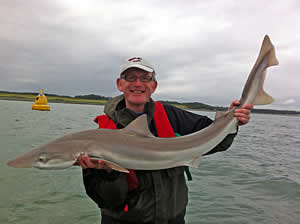
Stuart Cresswell with a tope shark.
Are Scottish tope shark stocks in decline and will we ever see any rays again?
These are two of the questions facing Scottish fisheries managers following last weeks Sharkatag as, for the third year in a row, the numbers of tope caught declined and no rays, other than thornbacks, were caught.
Sharkatag, held annually in South West Scotland, is the premier shark tagging event run by the Scottish Shark Tagging Programme (SSTP - www.tagsharks.com) . Last weekend, it once again received terrific support with anglers coming from all over the UK and fishing from over 50 boats and over 20 kayaks. As ususal, while there were many tagging stalwarts at the event, a good number of newcomers to the sport and Sharkatag were also welcomed.
According to Willie Kennedy of the events organizing Team: "On Friday expectation was high, the weather was reasonable, the tides were right but in terms of the number of fish caught, it was quite disappointing. Saturday was equally difficult with the boats fishing off Ardwell having the most success. Sadly the strong southerlies on Sunday made the day a washout - the first blown off day in the history of Sharkatag"
But whatever the conditions, it doesn't seem to dampen the spirits as feedback from one of this year's newcomers, Alasdair Fyfe, shows: "We had a fantastic time at Sharkatag 3, it was truly a remarkable time. I have to say a big thank you to everyone for all their help and advice during the 3 day event. Weather was not too brilliant but the atmosphere made up for the conditions. We are all looking forward to getting back out next year. Just cant wait. Thanks to you all."
Following an initial analysis of the data, Ian Burrett, the Scottish Sea Angling Conservation Network's (SSACN - www.ssacn.org) Project Director highlighted a major concern. "Evidence from this and previous years Sharkatags seems to confirm the anecdotal evidence that tope numbers are continuing to fall on an annual basis. We cannot be sure whether this is down to overfishing on their wintering grounds or a change in their Northern migration route due to some factor or another."
"Equally concerning is the data shows thornback ray stocks seem to be improving slightly, but not one cuckoo, blonde or spotted ray has been caught. Twenty years ago these species were abundant in the region - we need more research to find out why these fish are disappearing, but of course, funding is a major problem."
In a recent press release by Cabinet Secretary Lochhead said: "Protecting vulnerable marine species is crucially important. Some shark, skate and ray populations are critically endangered and already protected from commercial fishing. However, these species need additional protection and so Scotland intends to introduce a new protection order to help stock recovery."
However, thanks to all the volunteers who have put so much effort into tagging over the last 20 years or so, the findings of the Radford economic study and a substantial educational program, the SSTP has been able to show that the recreational 'shark' fishery contributes around £60 million/yr to the Scottish economy and that anglers can fish for those species without impacting stocks.
Consequently, recreational sea anglers will be able to continue to fish for the various species on a 'catch and release basis'.
